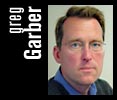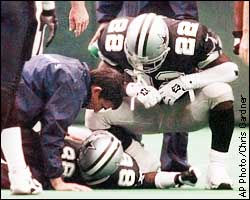 |
|
| | Thursday, October 21 | |||||||||||
Special to ESPN.com | ||||||||||||
| EAST RUTHERFORD, N.J. -- There was a little less than four minutes left in the third quarter of Monday night's Jaguars-Jets game when referee Mike Carey blew his whistle. A national television audience awaited the call.
Sure enough, a green edge of AstroTurf between the Jags' 45- and 46-yard-line was folded over on itself. Eight minutes later, play resumed. It was another reminder that artificial surfaces are basically asphalt topped with only a gym mat. After the game, several players happily bad-mouthed the turf. "It sucks," said one. "Like playing street football -- on the street. I can't wait until they get rid of it." The good news? Slowly, surely, it is happening. When another century passes, hopefully, artificial turf of the '70s, '80s and '90s might be seen as an indulgent sort of disco phase. "I can see the day," Giants vice president John Mara said Thursday, "when all the teams are playing on grass. I think the technology is going to be there." And, for the first time since AstroTurf and its chemical polymer relatives were invented in the mid-1960s, the sentiment for change is there as well. NFL teams are beginning to realize that artificial turf is not the cost-effective solution to grass they thought it was. The Giants and Jets, after several years of deliberations, will both be playing on grass next season at Giants Stadium. New facilities -- some already operational and others that will open in the next few years --- in Nashville, Pittsburgh, Cleveland, Cincinnati and Seattle feature grass. In recent years, the Chicago Bears, Kansas City Chiefs and New England Patriots have made the conversion from artificial turf to grass. By 2002, only nine of the league's 32 teams will play on turf. Six of them are inside (Minnesota, Indianapolis, Detroit, New Orleans, Atlanta and St. Louis), while three are outside (Buffalo, Philadelphia and Dallas). It is worth mentioning that Minnesota and Philadelphia, miserable with their stadium lease situations, could be playing on grass in Los Angeles by that time. The reason? Over time, turf takes a toll on players; they uniformly hate it. And while the NFL likes to point out that no studies prove conclusively that turf contributes to more major injuries than grass, virtually everyone agrees that the long-term effects are not positive. As someone who has spent more than a few hours on the turf at Giants Stadium, I can report that you feel it in your legs the next day. And that's without getting knocked around by 300-pound opponents. "From our point of view, and from a traditional point of view, football was meant to be played on grass," Mara said. "I've talked to the players about it. That was a big factor. They feel pretty strongly. There's less wear and tear on their bodies, no turf burns, no turf toe. But I'm not convinced there are more serious injuries." After Jets quarterback Vinny Testaverde suffered a ruptured Achilles tendon in the season opener at Giants Stadium, there was widespread speculation that the injury was due to turf. Mara asked the Giants orthopedic experts about it, and they told him that Achilles tend to snap after cumulative stress.
Nevertheless, the decision to play on grass is player friendly and, ultimately, bottom-line-friendly, too. With team payrolls past the $50 million mark, an investment of a few million dollars to increase player effectiveness and longevity makes sense. The Jets and Giants will share the $3 million cost of a high-tech grass system. The folks at the Meadowlands have been experimenting with large grass trays that are laid over the existing turf. In the wake of the successful 1999 World Cup experiment, the Giants and Jets tinkered with the system during the last two preseason games. The Jets, who have been hesitant to make the switch, finally came around although Mara insists, contrary to some published reports, that the Testaverde injury was not the decisive factor. Marcus Allen, who carried the football 3,022 times in NFL games (third, behind Walter Payton and Barry Sanders), was in Nashville on Wednesday working on a feature for CBS Sports about Eddie George and Ricky Williams, Heisman Trophy winners both. Allen, who played most of his games on grass for the Raiders, finished his career in Kansas City, which had artificial turf. "I am not a big proponent of artifical turf," Allen said. "With the exception of (Pittsburgh center) Mike Webster, how many guys have had really long, sustained careers on artificial turf?" Before Sunday, one answer was Dallas wide receiver Michael Irvin. The worst field in the league is Veterans Stadium in Philadelphia. Several years ago, in a terrific piece of journalism, Eagles safety Rich Miano took ESPN's Chris Mortensen on a tour of the field, pointing out the trouble spots. On Sunday, Irvin, in his 12th season, was injured on that very field. He was in the process of being tackled by Eagles cornerback Bobby Taylor when he ducked his head to avoid another hit by safety Tim Hauck. Irvin's helmet and neck twisted ever so slightly on impact with the turf as Hauck's helmet caught Irvin in the right shoulder blade. Irvin suffered a swelling of the spinal cord and a herniated disc at the top of his spinal column. Hauck's hit, illegal according to NFL spearing standards, apparently was not responsible for the damage as much as the impact with the turf. Would the injury have been less serious on grass? It's impossible to know, but certainly grass tends to give a little more than artificial turf, particularly in Philadelphia.
Irvin might well retire. Hopefully, artifical turf is right behind him.
| ALSO SEE While Young ponders retirement, 49ers consider cap
Garber: NFL injuries hurt more than ever
Cowboys' Irvin not ruling out retirement after neck injury
Bronco bummer: Davis out for year with knee injury
Falcons lose Anderson for season with knee injury
 | |||||||||||

